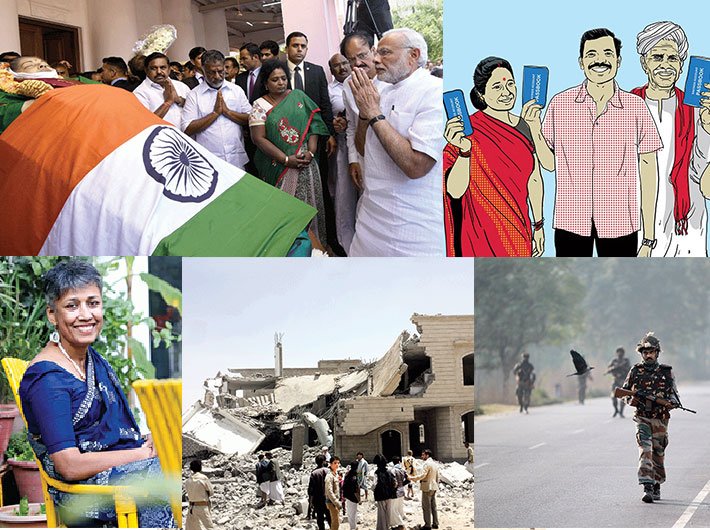We replug a list of five stories from our magazine and website that you must read over the weekend
In death as in life, Tamil Nadu’s enigmatic chief minister J Jayalalithaa retained her mystique. When she fell dangerously ill, people did not know – and were not told – what she was suffering from. When she was buried, people wondered why a woman who was a brahmin by birth was interred. Now, people are asking a multi-crore question: Who will inherit the properties of a woman who did not have any family member at her side when she breathed her last on December 5.
READ: Blank will
For three decades now, Chhattisgarh, caught up in insurgency and counterinsurgency, has been Nandini Sundar’s area of interest. The academician-activist’s latest book, The Burning Forest: India’s War in Bastar, sheds light on the inhuman militaristic policies and acts of the state and central government in Chhattisgarh and the war waged by the Maoists.
Sundar narrates how the war of resistance started in a tribal belt and affected its social fabric and being vocal about the situation in Chhattisgarh, she doesn’t fail to question the role of institutions like the National Human Rights Commission (NHRC), the centre and state police machinery, the CBI, the political parties, the bureaucracy, the media and the judiciary. In an interaction, she talks about the land and the people she has been associated with for the better part of her life.
READ: In Bastar, we are seeing a slow genocide of a whole way of life: Nandini Sundar
Anyone with even a scant idea of terrorists’ modus operandi would tell you that the Nagrota attack was the most serious of all onslaughts by Pakistan’s non-state actors in Jammu and Kashmir. The place is ensconced in the Trikuta foothills, a good 30 km aerial distance from the nearest point on the border with Pakistan. So far, the terrorists – they are stooges of the Pakistan army, whether they are from the Jamaat-ul-Mujahideen (JuM) or the Lashkar-e-Taiba (LeT) – had targeted military bases located close to the international border and the line of control: in Kaluchak (2002), Pathankot (January) and Uri (September). The very fact that they reached deep inside the territory and attacked an area with a huge army presence should be taken as an indication of Pakistan’s detailed preparations for continuing its proxy war against India.
READ: Why Nagrota attack should worry security mandarins
India ranks in the middle of a group of 26 emerging economies regarding access to formal financial services, according to a global study. The Brookings Financial and Digital Inclusion Project (FDIP) 2016 report has given India – with 860 million adult population – an overall score of 71 percent. In ‘country commitment’ India scores 100 percent, 72 percent in ‘mobile capacity’ and 94 percent in ‘regulatory environment’ and 44 percent in ‘adoption’.
READ: Govt, pvt sector must collaborate to bring women and migrants in formal banking
The UN has produced its first analysis of the socio-economic indicators in the Arab region since the 2011 uprisings. The results are not all heartening. The report titled ‘Arab Human Development Report (AHDR) 2016: Youth and the Prospects for Human Development in a Changing Reality’ that the United Nations Development Programme (UNDP) published on November 29 is the sixth AHDR since 2002. The region is experiencing a so-called youthful “demographic momentum” that – the report predicts – will last for at least the next two decades.
Despite such a large young population, (60 percent of its population has not yet reached the age of 30) the youth are not equipped for the labour market, particularly young women who are excluded from the formal economy. Unemployment here is highest among the world regions, reaching almost 30 percent and the situation is set to worsen by 2019.
READ: The lost youth of Arab states
